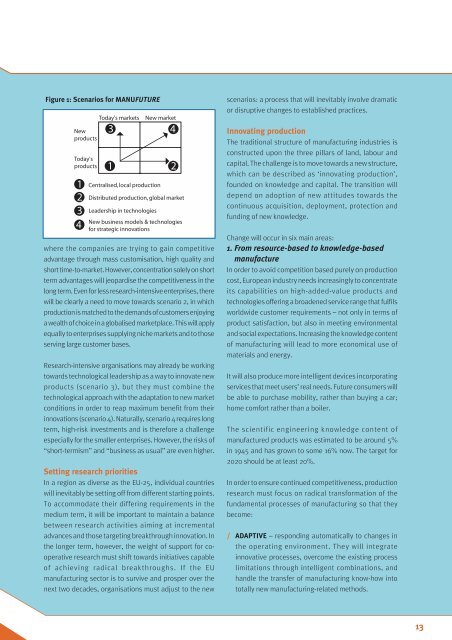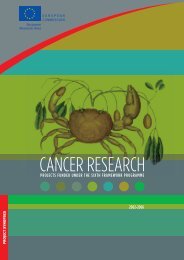MANUFUTURE – a vision for 2020
MANUFUTURE – a vision for 2020
MANUFUTURE – a vision for 2020
Create successful ePaper yourself
Turn your PDF publications into a flip-book with our unique Google optimized e-Paper software.
Figure 1: Scenarios <strong>for</strong> <strong>MANUFUTURE</strong><br />
where the companies are trying to gain competitive<br />
advantage through mass customisation, high quality and<br />
short time-to-market. However, concentration solely on short<br />
term advantages will jeopardise the competitiveness in the<br />
long term. Even <strong>for</strong> less research-intensive enterprises, there<br />
will be clearly a need to move towards scenario 2, in which<br />
production is matched to the demands of customers enjoying<br />
a wealth of choice in a globalised marketplace. This will apply<br />
equally to enterprises supplying niche markets and to those<br />
serving large customer bases.<br />
Research-intensive organisations may already be working<br />
towards technological leadership as a way to innovate new<br />
products (scenario 3), but they must combine the<br />
technological approach with the adaptation to new market<br />
conditions in order to reap maximum benefit from their<br />
innovations (scenario 4). Naturally, scenario 4 requires long<br />
term, high-risk investments and is there<strong>for</strong>e a challenge<br />
especially <strong>for</strong> the smaller enterprises. However, the risks of<br />
“short-termism” and “business as usual” are even higher.<br />
Setting research priorities<br />
In a region as diverse as the EU-25, individual countries<br />
will inevitably be setting off from different starting points.<br />
To accommodate their differing requirements in the<br />
medium term, it will be important to maintain a balance<br />
between research activities aiming at incremental<br />
advances and those targeting breakthrough innovation. In<br />
the longer term, however, the weight of support <strong>for</strong> cooperative<br />
research must shift towards initiatives capable<br />
of achieving radical breakthroughs. If the EU<br />
manufacturing sector is to survive and prosper over the<br />
next two decades, organisations must adjust to the new<br />
scenarios: a process that will inevitably involve dramatic<br />
or disruptive changes to established practices.<br />
Innovating production<br />
The traditional structure of manufacturing industries is<br />
constructed upon the three pillars of land, labour and<br />
capital. The challenge is to move towards a new structure,<br />
which can be described as ‘innovating production’,<br />
founded on knowledge and capital. The transition will<br />
depend on adoption of new attitudes towards the<br />
continuous acquisition, deployment, protection and<br />
funding of new knowledge.<br />
Change will occur in six main areas:<br />
1. From resource-based to knowledge-based<br />
manufacture<br />
In order to avoid competition based purely on production<br />
cost, European industry needs increasingly to concentrate<br />
its capabilities on high-added-value products and<br />
technologies offering a broadened service range that fulfils<br />
worldwide customer requirements <strong>–</strong> not only in terms of<br />
product satisfaction, but also in meeting environmental<br />
and social expectations. Increasing the knowledge content<br />
of manufacturing will lead to more economical use of<br />
materials and energy.<br />
It will also produce more intelligent devices incorporating<br />
services that meet users’ real needs. Future consumers will<br />
be able to purchase mobility, rather than buying a car;<br />
home com<strong>for</strong>t rather than a boiler.<br />
The scientific engineering knowledge content of<br />
manufactured products was estimated to be around 5%<br />
in 1945 and has grown to some 16% now. The target <strong>for</strong><br />
<strong>2020</strong> should be at least 20%.<br />
In order to ensure continued competitiveness, production<br />
research must focus on radical trans<strong>for</strong>mation of the<br />
fundamental processes of manufacturing so that they<br />
become:<br />
/ ADAPTIVE <strong>–</strong> responding automatically to changes in<br />
the operating environment. They will integrate<br />
innovative processes, overcome the existing process<br />
limitations through intelligent combinations, and<br />
handle the transfer of manufacturing know-how into<br />
totally new manufacturing-related methods.<br />
13

















